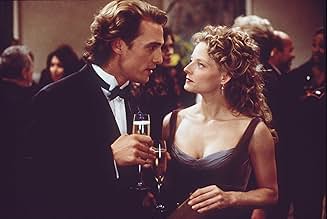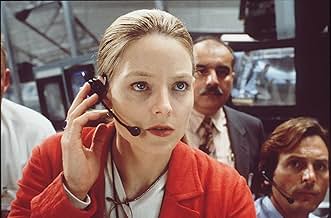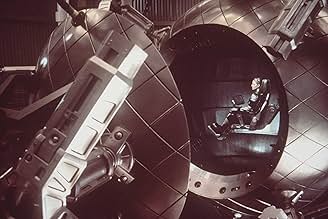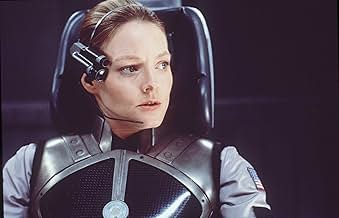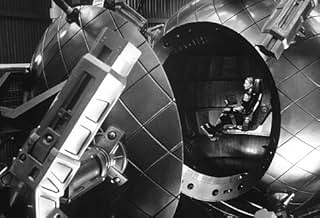Contact
- 1997
- Tous publics
- 2h 30min
Le docteur Ellie Arroway, après des années de recherche, trouve des preuves radio concluantes de l'existence d'une intelligence extraterrestre, qui envoie les plans d'une mystérieuse machine... Tout lireLe docteur Ellie Arroway, après des années de recherche, trouve des preuves radio concluantes de l'existence d'une intelligence extraterrestre, qui envoie les plans d'une mystérieuse machine.Le docteur Ellie Arroway, après des années de recherche, trouve des preuves radio concluantes de l'existence d'une intelligence extraterrestre, qui envoie les plans d'une mystérieuse machine.
- Réalisation
- Scénario
- Casting principal
- Nommé pour 1 Oscar
- 14 victoires et 32 nominations au total
Max Martini
- Willie
- (as Maximilian Martini)
Avis à la une
I had the luck of watching contact at the cinema when it came out . Being young meant that watching a movie of this grandure in a grand movie theatre with massive screen (something that was dying out at the time) means that this movie has been engraved in my mind .
But it is not due to nostalgia or corrupt memory .
Contact is a thought provoking mind bending movie ahead of its time .
In fact it is the Interstellar of the 90s .
Stunning gorgeous visuals , and a storyline and plot asking some hard questions and providing answers that many might not want to accept as the movie battles between science fitction , science fact and religion in a way that in the end no one is left wanting .
This is not just a movie , this is an event !
Stunning gorgeous visuals , and a storyline and plot asking some hard questions and providing answers that many might not want to accept as the movie battles between science fitction , science fact and religion in a way that in the end no one is left wanting .
This is not just a movie , this is an event !
N.B: This is a very long monologue because I adore CONTACT to bits.
I loved the irony present in Contact, as well as its religious imagery and its attention to fine detail. To see the universe in that opening scene was breath-taking, and the reason for it all coming out of Ellie's eye becomes blissfully apparent in light of the end, for her journey was just as much a physical as well as an emotional and spiritual one. The photography was superb, alternating between expansive sweeps of the landscape and the universe, and close, intimate shots of the characters, symbolising the potential for the unknown' as well as an equally important knowledge of all that is familiar contact with our own people.
The irony manifested itself in how Ellie, who denounced Palmer's ability to possess complete faith in God, ended up being the advocate of such a faith, though of a different strand; she could now appreciate Palmer's passion. Remember that Biblical verse that when paraphrased reads something like: `The man who is not willing to give up his life will lose it, but he who is willing will gain it'? This religious imagery correlates to how Drumlin lost his life in pursuit of personal acclaim, while Ellie, who admitted that she would freely give up her life in pursuit of life's tormenting questions, gained it in such a memorable and satisfying way. She found inner peace, having made contact with two intelligent races; one of the skies, and one of her own kind. The dried up cliché alluding to aliens: `We are not alone' begins to take on a new meaning in a multitude of dimensions in light of this brilliant movie.
I read this wonderful blurb' about Contact, and I think this following line delineates the film, and why watching Contact became such a defining film for me: `[Ellie's] personal voyage will take her beyond theory, beyond knowledge , beyond experience, to the realization that true vision is ultimately the union of fact and faith.' This duality of life and true fulfilment which arises from the reconcilement of contrary beliefs is surely a theme of the film: evinced through the conflict created by science vs. religion, fact vs. faith, vision vs. reality.
Carl Sagan's novel was also a fulfilling pleasure to read. I thought that the message in pi was an absolutely crucial element of the book, the implications of such a message being that there is an all-powerful force' behind the universe, which brings order to disorder, and such a force' we might call God. So possibly, C.S's novel did prove the existence of God. Maybe the recurring C' pattern in the film, (the quadruple' system Ellie saw near Vega, the sands in her father's hands and that which she holds in the end), is indicative of such order that no matter how large or small an event, i.e, whether a message is written in the sky or in the palm of one's hands, order is present, and implies a powerful force guiding the universe.
I am incapable of seeing many, if any, faults with this film I truly cannot understand why anyone would think it contrived or the same as something as brain-numbing and gung-ho as `Armageddon'. It is truly an intellectual film with meanings at many levels and so thought-provoking! Perhaps Matthew McConaughey's representation of Palmer Joss was a little unbelievable, and the thrice-repeated `It's an awful waste of space' phrase that connected Ellie to her father and Ellie to Palmer can be seen as a tad too sentimental on the one hand, but on the other, it serves to punctuate the potentiality of the physical universe, and the human mind, which, in C.S's case, conceived this book. Jodie Foster is magnificent, but then again, isn't she always? The extraordinary passion Ellie exhibited was admirable her innate sense of wonder balanced by a stabbing loneliness, born out of the premature departure of a dear parent.
I love Contact because of its poignant humanity, the sense of wonder that resonates so strongly throughout the film and indicates the strength of that wonder which inspired C.S in the first place, and because it searches for meaning so idealistically, while still, necessarily, maintaining the sometimes harsh realities of life (personified by James Woods' unsympathetic and skeptical Kitz).
To those who hated the ending, you obviously missed a crucial component of the film, that of possibility and potentiality. To have Ellie return with tangible evidence of alien existence would demolish all the credibility that Robert Zemeckis attempted to create by showing the current American president referring generically to the event of the message being discovered, the decision to build the machine, etc. The ending was crafted in such a way as to enable a choice by the viewer/reader to be made just like how C.S equally respected those in his book who chose to pursue a path of science or religion. We, the audience, are allowed to decide what really happened, and this makes Contact an almost interactive and therefore a more intimate experience.
Contact has something to say to everyone, and has real meaning that cannot help but whisk viewers and readers alike to some thrilling place. To those who thought the film predictable, and had not previously read the book, I would say that you must be VERY creative if you managed to anticipate all that Contact had to offer. But for everyone who was as much inspired by this magnificent film as I was, here's the most important lesson to be derived from both the book and the film: `For small creatures such as we the vastness is bearable only through love.' This enlightened message, dreamt up by Carl Sagan, makes me even more convinced that a book critic who said of Carl Sagan: `with terrestrials like him, who needs extras?' is exactly right.
I loved the irony present in Contact, as well as its religious imagery and its attention to fine detail. To see the universe in that opening scene was breath-taking, and the reason for it all coming out of Ellie's eye becomes blissfully apparent in light of the end, for her journey was just as much a physical as well as an emotional and spiritual one. The photography was superb, alternating between expansive sweeps of the landscape and the universe, and close, intimate shots of the characters, symbolising the potential for the unknown' as well as an equally important knowledge of all that is familiar contact with our own people.
The irony manifested itself in how Ellie, who denounced Palmer's ability to possess complete faith in God, ended up being the advocate of such a faith, though of a different strand; she could now appreciate Palmer's passion. Remember that Biblical verse that when paraphrased reads something like: `The man who is not willing to give up his life will lose it, but he who is willing will gain it'? This religious imagery correlates to how Drumlin lost his life in pursuit of personal acclaim, while Ellie, who admitted that she would freely give up her life in pursuit of life's tormenting questions, gained it in such a memorable and satisfying way. She found inner peace, having made contact with two intelligent races; one of the skies, and one of her own kind. The dried up cliché alluding to aliens: `We are not alone' begins to take on a new meaning in a multitude of dimensions in light of this brilliant movie.
I read this wonderful blurb' about Contact, and I think this following line delineates the film, and why watching Contact became such a defining film for me: `[Ellie's] personal voyage will take her beyond theory, beyond knowledge , beyond experience, to the realization that true vision is ultimately the union of fact and faith.' This duality of life and true fulfilment which arises from the reconcilement of contrary beliefs is surely a theme of the film: evinced through the conflict created by science vs. religion, fact vs. faith, vision vs. reality.
Carl Sagan's novel was also a fulfilling pleasure to read. I thought that the message in pi was an absolutely crucial element of the book, the implications of such a message being that there is an all-powerful force' behind the universe, which brings order to disorder, and such a force' we might call God. So possibly, C.S's novel did prove the existence of God. Maybe the recurring C' pattern in the film, (the quadruple' system Ellie saw near Vega, the sands in her father's hands and that which she holds in the end), is indicative of such order that no matter how large or small an event, i.e, whether a message is written in the sky or in the palm of one's hands, order is present, and implies a powerful force guiding the universe.
I am incapable of seeing many, if any, faults with this film I truly cannot understand why anyone would think it contrived or the same as something as brain-numbing and gung-ho as `Armageddon'. It is truly an intellectual film with meanings at many levels and so thought-provoking! Perhaps Matthew McConaughey's representation of Palmer Joss was a little unbelievable, and the thrice-repeated `It's an awful waste of space' phrase that connected Ellie to her father and Ellie to Palmer can be seen as a tad too sentimental on the one hand, but on the other, it serves to punctuate the potentiality of the physical universe, and the human mind, which, in C.S's case, conceived this book. Jodie Foster is magnificent, but then again, isn't she always? The extraordinary passion Ellie exhibited was admirable her innate sense of wonder balanced by a stabbing loneliness, born out of the premature departure of a dear parent.
I love Contact because of its poignant humanity, the sense of wonder that resonates so strongly throughout the film and indicates the strength of that wonder which inspired C.S in the first place, and because it searches for meaning so idealistically, while still, necessarily, maintaining the sometimes harsh realities of life (personified by James Woods' unsympathetic and skeptical Kitz).
To those who hated the ending, you obviously missed a crucial component of the film, that of possibility and potentiality. To have Ellie return with tangible evidence of alien existence would demolish all the credibility that Robert Zemeckis attempted to create by showing the current American president referring generically to the event of the message being discovered, the decision to build the machine, etc. The ending was crafted in such a way as to enable a choice by the viewer/reader to be made just like how C.S equally respected those in his book who chose to pursue a path of science or religion. We, the audience, are allowed to decide what really happened, and this makes Contact an almost interactive and therefore a more intimate experience.
Contact has something to say to everyone, and has real meaning that cannot help but whisk viewers and readers alike to some thrilling place. To those who thought the film predictable, and had not previously read the book, I would say that you must be VERY creative if you managed to anticipate all that Contact had to offer. But for everyone who was as much inspired by this magnificent film as I was, here's the most important lesson to be derived from both the book and the film: `For small creatures such as we the vastness is bearable only through love.' This enlightened message, dreamt up by Carl Sagan, makes me even more convinced that a book critic who said of Carl Sagan: `with terrestrials like him, who needs extras?' is exactly right.
10ada-p
So many movies out there are pure drivel. They use sex, or shock, or sex to sell two hours of something that in no way contributes to our existence; be it inspiration, knowledge or spiritual awakening.
Contact is an exceptional example of a movie that DESERVES to exist. From the spectactular beginning shot that shows us just how small we are in a world that once thought the universe was made for, and around, mankind; to its realistic conclusion that any X-Phile would expect to happen: this movie appeals to our humanity, intelligence and sense of adventure.
One of the greatest realisations that the movie will guide you to is that what we search for in outer space is actually in our own backyards. We are cut off from each other and sci-fi tries to quell our loneliness with ideas that we'll meet E.T. and wont feel so lonely in our existence. But were AREN'T alone... we have each other.
I never get tired of watching this movie, though I wish they brought out a packed special edition DVD full of behind the scene effects and the like.
Contact is an exceptional example of a movie that DESERVES to exist. From the spectactular beginning shot that shows us just how small we are in a world that once thought the universe was made for, and around, mankind; to its realistic conclusion that any X-Phile would expect to happen: this movie appeals to our humanity, intelligence and sense of adventure.
One of the greatest realisations that the movie will guide you to is that what we search for in outer space is actually in our own backyards. We are cut off from each other and sci-fi tries to quell our loneliness with ideas that we'll meet E.T. and wont feel so lonely in our existence. But were AREN'T alone... we have each other.
I never get tired of watching this movie, though I wish they brought out a packed special edition DVD full of behind the scene effects and the like.
The 90's movies have a certain charm you can not replicate. It makes you belive in better things, makes you want to be better. I liket this movie because it focused on mankind, and not just America. Do not take me wrong. I dont have any problem with America, but there are a lot of things you have to consider besides that nation. I liked the how it made me think about the everlasting parallel between belief and technology. It gives you the right to choose, what you want to belive in. That is a very nice thing nowadays.
This, for me, is a masterpiece. I have enjoyed it more with each viewing.
Carl Sagan was a great man. He promoted science in the way it should be, portraying the profound mysteriousness of our universe with humility, and without dogma. In his book, the Demon-Haunted World, he quoted Einstein:
"All our science, measured against reality, is primitive and childlike -- and yet it is the most precious thing we have".
Contact conveys this simple message in a subtle yet immensely powerful way. The performances are some of the most compelling I have seen, particularly by Jodie Foster and David Morse.
Just magnificent.
Carl Sagan was a great man. He promoted science in the way it should be, portraying the profound mysteriousness of our universe with humility, and without dogma. In his book, the Demon-Haunted World, he quoted Einstein:
"All our science, measured against reality, is primitive and childlike -- and yet it is the most precious thing we have".
Contact conveys this simple message in a subtle yet immensely powerful way. The performances are some of the most compelling I have seen, particularly by Jodie Foster and David Morse.
Just magnificent.
Le saviez-vous
- AnecdotesAuthor and producer Carl Sagan died during production. He was reportedly taking great care to ensure that science was accurately depicted in this movie.
- GaffesWalkie-talkies and cell phones are not allowed near a radio telescope array. They would overpower the array, making it useless.
- Crédits fous"For Carl"
- ConnexionsEdited into Zaum - Andare a parare: Lo spazio dell'orbita (2011)
- Bandes originalesWho Needs Wings to Fly
Written by Dominic Frontiere and Sid Wayne
Meilleurs choix
Connectez-vous pour évaluer et suivre la liste de favoris afin de recevoir des recommandations personnalisées
Détails
- Date de sortie
- Pays d’origine
- Sites officiels
- Langues
- Aussi connu sous le nom de
- Contacto
- Lieux de tournage
- Arecibo Observatory, Arecibo, Porto Rico(large radio telescope)
- Sociétés de production
- Voir plus de crédits d'entreprise sur IMDbPro
Box-office
- Budget
- 90 000 000 $US (estimé)
- Montant brut aux États-Unis et au Canada
- 100 920 329 $US
- Week-end de sortie aux États-Unis et au Canada
- 20 584 908 $US
- 13 juil. 1997
- Montant brut mondial
- 171 120 329 $US
- Durée
- 2h 30min(150 min)
- Couleur
- Mixage
- Rapport de forme
- 2.39 : 1
Contribuer à cette page
Suggérer une modification ou ajouter du contenu manquant




